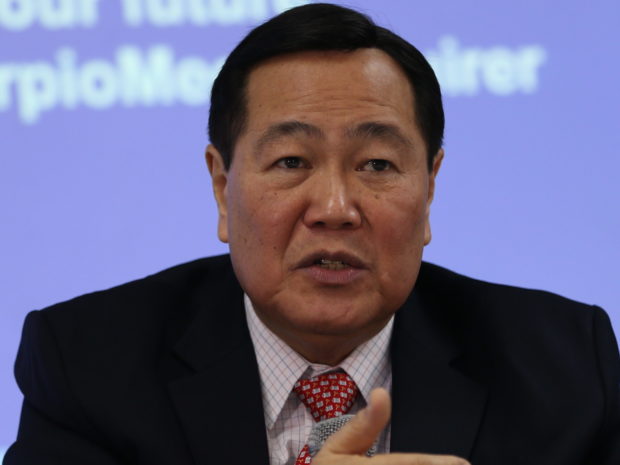Carpio idea vs ‘trolls’ welcomed, but…

Supreme Court Senior Justice Antonio Carpio. INQUIRER FILE PHOTO
Retired Associate Justice Antonio Carpio’s proposal that news agencies and social media platforms require their users to disclose their true identities might be “well-meaning” but is “not feasible,” a group of journalists said on Thursday.
The National Union of Journalists of the Philippines (NUJP) also said such a rule was unlikely to repel so-called trolls as desired by the former magistrate.
In a statement sent to the Inquirer, NUJP said the burden of repelling trolls should not be on news organizations. Instead, state actors who fund so-called troll farms should be held to account, it said.
Troll farms are groups of people who create fake personas online to deliberately spread disinformation or offensive internet posts against certain persons, groups or advocacies. The goal of troll farm operators is to manipulate or twist public opinion.
Recently, 12 senators filed a resolution to look into the operations of “state-backed and state-funded” troll farms ahead of the 2022 elections.
2022 poll outcome
In an online forum on Wednesday, Carpio, the lead convener of the opposition 1Sambayan coalition, warned that troll farms might affect the outcome of the May 2022 elections.
He said trolls use fictitious names to attack “real people, politicians and the opposition” and that the “simple” solution to blunt their efforts was to make them reveal their true identity.
“If you put your real name, you will be circumspect. You will weigh every word you put there because you could be sued for libel or you could be laughed at if you’re expressing something ridiculous,” Carpio said.
“When you use a fictitious name, you don’t feel any responsibility. You attack, attack and attack. You make libelous comments because you … cannot be held to account,” he added.
Carpio pointed out that online forums, including the comments sections of news websites, had become “so polluted, so vicious and so unreasonable” because users were able to hide their true identities.
Citing a report by Facebook security policy head Nathaniel Gleicher in September last year, Carpio said most of the bogus accounts were created by internet users based in Fujian province in China.
He said all the media websites allow Chinese trolls to comment in local publications using fake names.
Carpio said requiring users to disclose their real identities would help protect the public from being misled by troll farm operators, especially those in foreign countries.
Right to privacy
“Justice Carpio’s proposal, though well-meaning, will not repel trolls,” NUJP said in response. “It is not even feasible because IP addresses, not real names, serve as the unique identity when accessing websites.”
An IP (internet protocol) address is the numerical identification of a specific device on the internet or a local network.
NUJP said the use of virtual private networks (VPN)—which mask IP addresses—became necessary for some people because they had come under digital threats and attacks.
The group also upheld the people’s right to use whatever names they wanted on their social media accounts to protect their privacy.
In creating a Facebook and Twitter account, one needs to submit personal information, including a username or the name that will appear on a person’s account, password, date of birth and gender. An email or a mobile phone number is also needed to verify and finish setting up the account.
NUJP said social media companies also have a “huge role to play” as they are in a better position to prevent persons or groups from abusing their platforms.
It issued similar calls made by international groups like the independent Real Facebook Oversight Board cofounded by Pulitzer Prize winner Carole Cadwalladr, who urged social media giants to curb disinformation on their platforms, especially seeing how they’re being used to manipulate elections and sow hate against minorities.
“Putting the burden on news agencies and websites to deter trolls is a myopic appreciation of the issue,” NUJP said.
“The troll problem is a complex one—it should be addressed by informing and educating the public, and pressuring state actors to stop funding these troll farms that destroy the free exchange of ideas on social media.”
Lawyer Antonio La Viña, who teaches constitutional law, believes that Carpio’s proposal is “reasonable” and does not infringe on privacy rights.
La Viña said, however, that there should be a law that requires such identity disclosure.
In Wednesday’s forum, Carpio said that the slanderous attacks by proadministration trolls had prompted some possible candidates of 1Sambayan to defer announcing their plans for next year’s polls.
The coalition, which named Vice President Leni Robredo among its possible standard-bearers, had listed 24 possible senatorial candidates, according to Carpio.
“If they announce [their candidacies] now, they will be attacked by President Duterte’s trolls. So, they are delaying their announcements. We also delayed the nomination period,” he said. —WITH A REPORT FROM ANA ROA, INQUIRER RESEARCH














